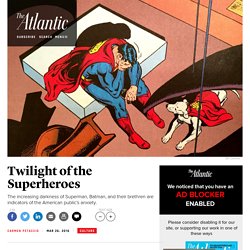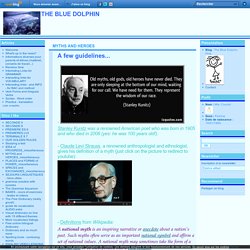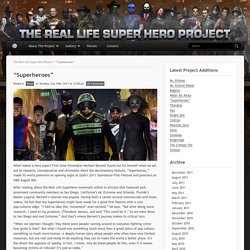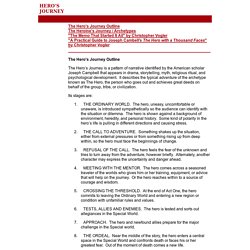

The Hero Archetype in Literature, Religion, Movies, and Popular Culture: A Graduate Project. How Superheroes Like Superman, Batman, and the Villains of 'Suicide Squad' Reflect American Anxieties. In his review of X-Men (2000), Roger Ebert begins with an evocation of the mythological gods of Ancient Greece, and ends with a plea to die-hard comic-book fans, whom he wishes would “linger in the lobby after each screening to answer questions.”

Sixteen years later, viewed from a cinematic present overrun by the cape and cowl, Ebert’s words read as both prescient and portentous. The rise of the superhero blockbuster, which began in earnest with the release of Spider-Man, in 2002, is comparably bifold, driven by two dissimilar but potent cultural forces: a civilization’s ancient, collective need for a self-defining myth, and the thoroughly modern drive to commodify that desire. Superheroes have become the contemporary American equivalent of Greek gods—mythic characters who embody the populace’s loftiest hopes, its deepest insecurities, and flaws.
And yet, as of late movie superheroes have seemed less inclined to heroics. Examing the Meaning of Hero. MYTHS AND HEROES - The Blue Dolphin blog. A few guidelines...

Stanley Kunitz was a renowned American poet who was born in 1905 and who died in 2006 (yes: he was 100 years old!). - Claude Levi Strauss, a renowned anthropologist and ethnologist, gives his definition of a myth (just click on the picture to redirect to youtube): - Definitions from Wikipedia: A national myth is an inspiring narrative or anecdote about a nation's past. Such myths often serve as an important national symbol and affirm a set of national values. A national myth is a legend or fictionalized narrative which has been elevated to a serious mythological, symbolic, and esteemed level so as to be true to the nation.[1] It might simply over-dramatize true incidents, omit important historical details, or add details for which there is no evidence; or it might simply be a fictional story that no one takes to be true literally,[2] but contains a symbolic meaning for the nation.
National myths serve many social and political purposes. Create Comics with Chogger. Marvel Kids Games: The Official Site - Iron Man, Spider-Man, Hulk, X-Men, Captain America, Thor, Wolverine, Ultimate Spider-Man, Superhero Squad, Fantastic Four, Avengers: Earth's Mightiest Heroes, Activities & Puzzles, Online Game. The Real Life Super Hero Project. Posted in News on Tuesday, July 19th, 2011 at 12:00 pm What makes a hero super?

First-time filmmaker Michael Barnett found out for himself when he set out to research, conceptualize and ultimately shoot the documentary feature, “Superheroes,” made its world premiere on opening night at Utah’s 2011 Slamdance Film Festival and premiers on HBO August 8th. After reading about the Real Life Superhero movement online in articles that featured such prominent community members as San Diego, California’s Mr. Extreme and Orlando, Florida’s Master Legend, Barnett’s interest was piqued. Having built a career around commercials and music videos, he felt that the Superheroes might have made for a good first feature with a cool pop-cultural edge. “When we started I thought ‘Hey there were people running around in costumes fighting crime how great is that?’
“You know, it’s kind of hard to look back now at what my original intentions were,” he continues. Hero's journey. "A Practical Guide to Joseph Cambell’s The Hero with a Thousand Faces" by Christopher Vogler © 1985 “There are only two or three human stories, and they go on repeating themselves as fiercely as if they had never happened before.”

In the long run, one of the most influential books of the 20th century may turn out to be Joseph Campbell’s THE HERO WITH A THOUSAND FACES. The book and the ideas in it are having a major impact on writing and story-telling, but above all on movie-making. Filmmakers like John Boorman, George Miller, Steven Spielberg, George Lucas, and Francis Coppola owe their successes in part to the ageless patterns that Joseph Campbell identifies in the book. The ideas Campbell presents in this and other books are an excellent set of analytical tools. With them you can almost always determine what’s wrong with a story that’s floundering; and you can find a better solution almost any story problem by examining the pattern laid out in the book.
There’s nothing new in the book. Main/The Hero's Journey.